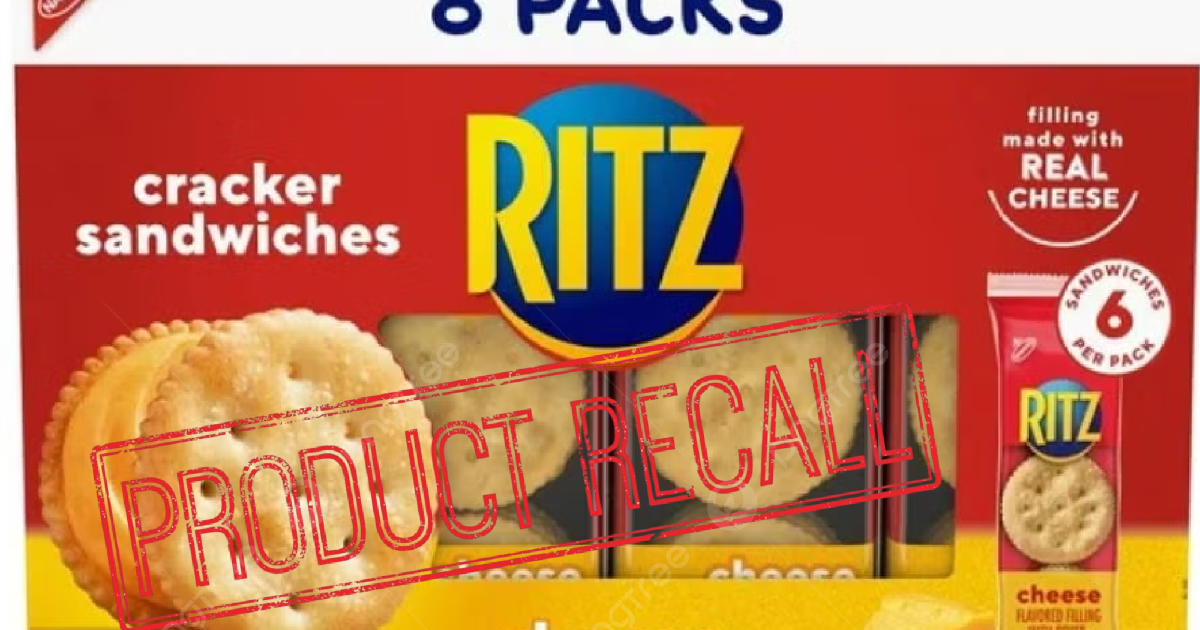The U.S. Food and Drug Administration (FDA) has issued an urgent recall for specific batches of Ritz crackers, warning consumers about the presence of an undeclared peanut ingredient. This critical alert targets millions of Americans, especially the estimated 3 million individuals suffering from peanut allergies, who could face “serious or life-threatening allergic reactions” if they unknowingly consume the affected products.
The recall specifically impacts Ritz Cracker Sandwiches with peanut butter and possibly other Ritz cracker varieties that may have been cross-contaminated. While the specific product names and batch codes are crucial for consumers to verify, the FDA emphasizes that these recalled items were sold nationwide, making it imperative for everyone to check their snack stashes. Major retailers across the country, including Target, CVS, and Dollar General, are among the many stores that carried these popular cracker products, highlighting the widespread potential exposure.
What You Need to Know: Identifying the Recalled Products
The issue centers on certain individually wrapped packages of Ritz Cracker Sandwiches that contain peanut butter but are mistakenly labeled as “cheese” cracker sandwiches. While the outer cartons of these products are correctly labeled and include allergen warnings for peanuts, the mislabeling on the inner individual packs poses a severe risk to those with peanut sensitivities.
For those with peanut allergies or households where individuals with such allergies reside, identifying the recalled products is paramount. Consumers should look for specific product names, lot codes, and “best by” dates as detailed in the official FDA recall announcement. Typically, this information is found on the packaging. If you possess any Ritz cracker products, particularly sandwiches, it is strongly advised to visit the FDA’s website or the manufacturer’s official recall page for the most accurate and up-to-date list of affected items. Do not rely solely on store names, as product distribution can vary.
According to statements from the U.S. Food and Drug Administration (FDA) and Mondelēz, the recall affects various carton sizes of RITZ Peanut Butter Cracker Sandwiches (8-pack, 20-pack, and 40-pack) and the 20-pack RITZ Filled Cracker Sandwich Variety Pack. Consumers should look for products with “Best When Used By” dates ranging from November 1-9, 2025, and January 2-22, 2026, and specific plant codes such as “AE,” “AM,” or “RJ.” Other Ritz products or those with different date codes and plant codes are not affected by this recall.
The Gravity of the Risk: Why This Recall is Critical
For most consumers, an undeclared ingredient might seem like a minor oversight. However, for those with a peanut allergy, even a trace amount of peanuts can trigger a severe, potentially fatal anaphylactic reaction. Symptoms can range from mild (hives, itching, nausea) to life-threatening (swelling of the throat, difficulty breathing, dizziness, drop in blood pressure). This recall isn’t just about a labeling error; it’s about protecting vulnerable lives.
Immediate Action Required: What to Do If You Have Recalled Crackers
If you have purchased any Ritz cracker products recently, especially cracker sandwiches, and suspect they might be part of this recall, follow these steps immediately:
- Do Not Consume: Under no circumstances should you or anyone in your household consume the product if it matches the recall criteria.
- Verify: Check the product against the specific details provided in the official FDA recall notice (product name, UPC, lot code, best by date).
- Return or Dispose: If your product is part of the recall, return it to the place of purchase for a full refund or dispose of it safely, ensuring no one can access it.
- Seek Medical Attention: If you or someone you know has consumed the recalled product and experiences any allergic reaction symptoms, seek immediate medical attention. Do not wait for symptoms to worsen.
This urgent recall serves as a critical reminder of the importance of checking food labels diligently, especially for those managing food allergies. The FDA continues to monitor the situation, and consumers are encouraged to stay informed by checking official sources for updates. Your vigilance could save a life.


